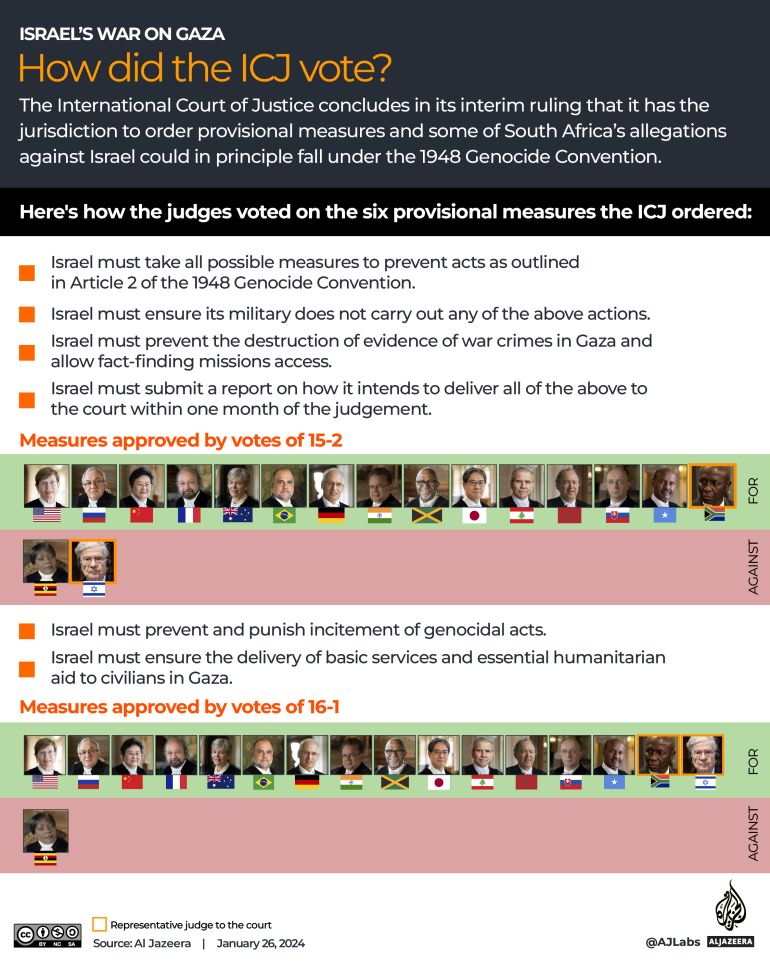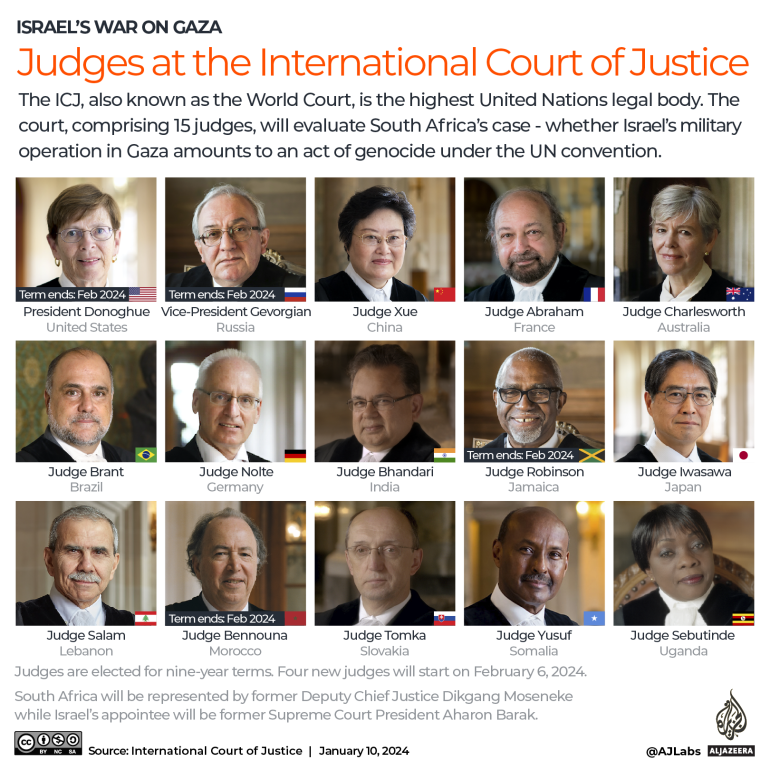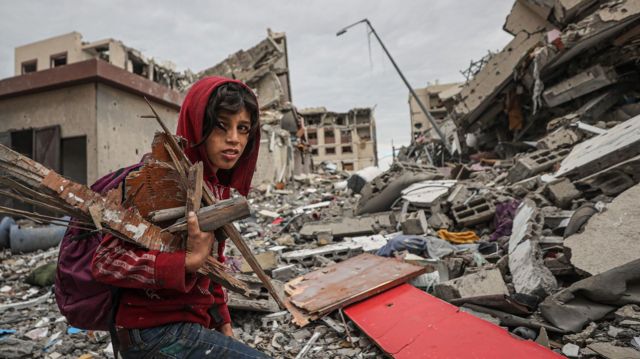Image of Gaza courtesy of BBC.
By Areesha Lodhi.
(Al Jazeera)The International Court of Justice (ICJ) issued Israel with six orders in relation to its bombardment of Gaza on Friday, but stopped short of calling for a full ceasefire.
The emergency measures were announced as the court begins its deliberations on South Africa’s genocide case against Israel, for which it heard evidence earlier this month. South Africa has described Israel’s actions in Gaza as genocide but Israel has rejected the allegation, claiming that its activities in Gaza stem from “self-defence”, and are necessary to root out Hamas. It has added that the war cannot end until that goal has been achieved.
In a 45-minute judgement at the court in the Hague on Friday, presiding judge Joan Donoghue rejected Israel’s claim that the court lacks jurisdiction to hear South Africa’s case against it.
Israel said that South Africa failed to adequately communicate with Tel Aviv about the case before filing the application, as is required by the court’s own rules. However, the court rejected this argument, stating that South Africa had made a complaint to the Israeli embassy in Pretoria, to which Israel had clearly responded. Therefore a “dispute” over the interpretation of the law relating to genocide exists. South Africa has clear standing to submit its case, the court ruled.
South Africa had also requested nine emergency measures be taken against Israel by the court. The ICJ directed Israel to implement six.
Israel’s war on Gaza has already killed more than 26,000 Palestinians in the besieged enclave. Israel’s blockade on the strip has also severely restricted access to food, water, fuel and medical support.
Here is what you need to know about the ruling, its impact, and what might happen next.
What is in the ICJ’s ruling?
The ICJ confirmed that it does have jurisdiction to hear the case submitted by South Africa and issued six emergency orders to Israel, as follows:
- Israel must take all possible measures to prevent acts as outlined in Article 2 of the 1948 Genocide Convention. This entails not killing members of a particular group (in this case, Palestinians), not causing physical or psychological harm to members of that group, not inflicting living conditions which are calculated to bring about the end of the existence of a people, and not carrying out actions designed to prevent births within that group of people.
Measure approved by a vote of 15-2. Dissenting judges: Judge Julia Sebutinde of Uganda and the Israeli representative, Judge Aharon Barak.
- Israel must ensure its military does not carry out any of the above actions.
Measure approved by a vote of 15-2. Dissenting judges: Judge Sebutinde of Uganda and the Israeli representative, Judge Barak.
- Israel must prevent and punish the “direct and public incitement to commit genocide in relation to members of the Palestinian group in the Gaza Strip”.
Measure approved by a vote of 16-1. Dissenting judge: Judge Sebutinde of Uganda.
- Israel must ensure the delivery of basic services and essential humanitarian aid to civilians in Gaza.
Measure approved by a vote of 16-1. Dissenting judge: Judge Sebutinde of Uganda.
- Israel must prevent the destruction of evidence of war crimes in Gaza and allow fact-finding missions access.
Measure approved by a vote of 15-2. Dissenting judges: Judge Sebutinde of Uganda and the Israeli representative, Judge Barak.
- Israel must submit a report on all steps it has taken to abide by the measures imposed by the court within one month of the judgement. South South Africa will have the chance to respond to this report.
Measure approved by a vote of 15-2. Dissenting judges: Judge Sebutinde of Uganda and the Israeli representative, Judge Barak.

What emergency measures did South Africa request?
South Africa’s 84-page lawsuit, filed on December 29, 2023, accused Israel of violating the 1948 Genocide Convention in the war on Gaza that began on October 7, 2023.
South Africa asked the court to order Israel to:
- Suspend military operations in and against Gaza (not addressed in the court’s provisional measures)
- Not escalate military operations any further (not addressed in the court’s provisional measures)
- Allow access to adequate food, water, fuel, shelter, hygiene and sanitation.
- Prevent the destruction of Palestinian life in Gaza, including psychological damage
- Not destroy evidence that would support genocide allegations, nor deny international organisations such as fact-finding missions, access to Gaza to help preserve this evidence.
- Abide by the rules of the Genocide Convention.
- Take steps to punish those who have been involved in genocide (not included in the court’s provisional measures).
- Avoid actions that would complicate or prolong the case (not included in the court’s provisional measures).
- Regularly report to the council on their progress toward implementing the measures.
Is the interim ruling binding and who will enforce it?
As members of the United Nations, both South Africa and Israel are bound by the court’s rulings and cannot appeal a decision. However, the ICJ itself does not have any mechanism to enforce its orders.
South Africa or other nations could also go to the UN Security Council (UNSC), where member states would be asked to vote to require Israel to abide by the emergency measures ordered by the ICJ.
On previous occasions since the war on Gaza began, the US has used its power of veto to block resolutions calling for a ceasefire and for accountability of its close ally, Israel. However, experts say that Washington’s veto of an ICJ-approved decision could damage and undermine US President Joe Biden’s calls for others – including rivals like China and Russia – to uphold the international rules-based order
“This could make a real difference for the US administration and certainly a pose real dilemma for it,” James Bays, Al Jazeera English’s diplomatic editor said, reporting from The Hague.
If the UNSC passes a resolution requiring Israel to abide by the orders of the ICJ, it would have the power to take punitive action against Israel. Past examples of this have included economic or trade sanctions, arms embargoes and travel bans.
The UN charter also allows the Council to go a step further and intervene with force. An example of this was the 1991 US-led military alliance that was created to counter the invasion of Kuwait by the Iraqi leader, Saddam Hussein. Experts believe it is highly unlikely that the US will allow the Security Council to take any such step against Israel.
Neve Gordon, professor of international law at Queen Mary University of London, added that countries, such as the US, would now have to seriously rethink using a veto or even normalisation of diplomatic ties with Israel.
“It’s a new ballgame now, where the highest court in the world is saying, prima facie [on first impression], Israel is committing genocide”, he said.
What happens next at the ICJ?
Friday’s ruling was just an interim ruling to address the emergency measures requested by South Africa.
Israel is required to submit its report on the actions it is taking to fulfil the above emergency orders by February 26 – one month from Friday’s ruling. South Africa will then be given the chance to respond to this report.
The court will then assess the report and additional information on Gaza’s on-ground realities. It could conclude that Israel is not abiding by the first provisions and impose new ones.
The court will then also move forward with additional hearings and deliberations on the evidence presented to the court earlier this month by South Africa supporting its accusations against Israel, and of Israel’s defence.
The judges will individually evaluate South Africa’s key claims in relation to genocide in Gaza, and the court’s eventual ruling will be determined by a majority.
The court said its decision to move forward with the case was based on its conclusion that South Africa’s evidence alleging genocide by Israel could not be ruled out “prima facie”.
Gordon said that this is “major”.
Experts have it could be three or four years before a judgement is passed.
Who are the judges and who voted against the orders?
Also called the World Court, the ICJ is a UN civil court that adjudicates disputes between countries. It is distinct from the International Criminal Court (ICC), which prosecutes individuals for war crimes.
The ICJ comprises 15 judges who are appointed for terms of nine years through elections at the UN General Assembly (UNGA) and the Security Council (UNSC). For this case, they are joined by two special representative judges – Deputy Chief Justice Dikgang Moseneke from South Africa and Supreme Court President Aharon Barak from Israel.
Judges are supposed to be impartial but in the past, some have voted in line with their countries’ politics. For instance, when Ukraine approached the ICJ seeking provisional measures against Russia, including an order that the Kremlin halt its war, 13 out of 15 judges voted in favour of Kyiv’s request. The only two who did not were the judges from Russia and China.
On Friday, the only two judges who dissented from all or some of the measures imposed by the court were Judge Julia Sebutinde of Uganda, who voted against all of the orders, and Judge Aharon Barak, who voted against four of the six orders.
Judge Sebutinde released her dissenting opinion, in which she argued that she did not agree that Israel had shown “intent” to commit genocide and, therefore, the case did not fall within the remit of the ICJ.

What’s next for Israel and Gaza?
Although the ICJ stipulated that Israel must abide by the 1948 Genocide Convention, it stopped short of calling for a ceasefire or suspension of hostilities.
“I see no way that Israel can abide by the other provisional measures without stopping its hostilities,” said Gordon, noting that steps like increased humanitarian aid would require a ceasefire.
Previous reports have shown that broken roads and continued Israeli bombardment have obstructed aid from being effectively disbursed in the enclave.
The Knesset would have to vote to revoke a member’s immunity before punishing them, which Gordon says is unlikely considering the majority of them support Israel’s war on Gaza.
Nonetheless, Israel would have to try and punish non-parliamentarians, including troops and commentators, for statements that call for the mass killing of Palestinians.
Furthermore, the court made special reference to comments made by three senior Israeli officials which it deemed to show genocidal intent. Gordon said that the court’s reference to these statements made by officials, including Israeli President Izaac Herzog, was “extremely important”. It showed that the court “clearly” disagrees with Israeli interpretations that such comments are sporadic and have no causal relation with the country’s military operations, he said.
Neil Sammonds, senior campaigner on Palestine at the human rights group, War on Want, said it would be difficult to enforce the measures ordered by the court, however. “This leaves everything in Israel’s hands. There are no specifics about how Israel should bring in more aid and Netanyahu has already said Israel will not abide by the court’s ruling.”
